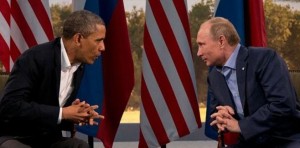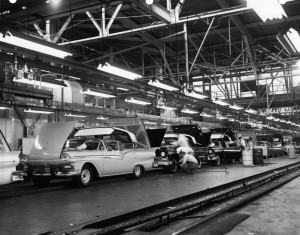Meditations – If the situation with Russia gets any worse, millennials may start building bomb shelters again. As the New York Times says, “The dispute over Mr. Snowden is less a singular sore point between the United States and Russia than a symptom of a relationship that has soured across the board.”
 That’s Edward J. Snowden, the Rorschach of America’s Jekyll-Hyde national character since the end of the Cold War, and especially 9.11. ‘He’s a whistle-blowing hero!’ ‘No, he’s a traitorous commie!’ It all depends on which side of psychological Mason-Dixon line you fall.
That’s Edward J. Snowden, the Rorschach of America’s Jekyll-Hyde national character since the end of the Cold War, and especially 9.11. ‘He’s a whistle-blowing hero!’ ‘No, he’s a traitorous commie!’ It all depends on which side of psychological Mason-Dixon line you fall.
On one hand, President Obama says, “I’m not going to be scrambling jets to get a 29-year-old hacker;” on the other he cancels out of a meeting with Putin at a G-20 summit in Russia in September.
This sideshow is playing out as more and more Americans care less and less about what Uncle Sam does abroad, only about what he’s done for me lately. Unless, of course, you belong to the cuckoo- bird wing of the Republican Party. Then you blame the Federal government for everything from the cavities in your teeth to the crumbling social order under your feet and over your head.
I think Barack Obama understands America’s national characterlessness very well. After all, he ran a perfect ‘transformation’ con in 2008, and a perfect ‘you’re think I’m bad, look at the alternative’ campaign in 2012.
Reflecting one of the many splits in the national psyche, a common attitude among Obama supporters is to applaud his domestic policy advances while ignoring his disturbing foreign policy ‘Bushiness.’
Doubling down in Afghanistan, quadrupling drone attacks worldwide, sitting on his hands with Guantanamo after promising to close it, and exponentially increasing spying and data vacuuming on Americans (all in all, “the new American way of war”), requires a schizoid worldview on the part of the president and the people alike.
Obama remains popular, mainly because so many people have bought into the notion that he’s a well-intentioned, hamstrung progressive, not a calculating, high-strung politician like all the rest.
Barack really does believe he’s above the muck of Washington, which is also why so many people dislike him on the right, and distrust him on the left. If you’re going to play in the mud, you’ve got to get down into the mud.
A lot of Americans are struggling, but somehow the nation stumbles on. People don’t care, or even much notice that the despot Putin has spit in our eye by granting Snowden asylum.
Whether the Russian-American relationship degenerates into farce, or becomes genuinely dangerous for the world again is anyone’s guess. We’re already fighting a proxy war in Syria, whose people continue to be the sacrificial lambs of the Middle East, since neither former superpower, nor anyone else in truth, actually gives a damn about them.
Meanwhile, the United States stares into its own abyss, embodied by the long festering wound that is Detroit, a shrinking industrial city that just won’t disappear.
I grew up in Michigan during the heyday of the auto industry. Michigan is a place where you can’t turn around without stepping into a big or small lake. Forty-five years ago you couldn’t turn a buck without some connection to the industrial powerhouse that was auto industry out of Detroit.
The car changed America from a rural nation into an urban one, from an agrarian country to the industrial behemoth that launched a 30-story building to the moon.
All roads led from Detroit but few led to it. And so when the centralized car industry died, so did Detroit. To a large degree, manufacturing in America died the same slow death as Detroit.
 And now here we are, burying Detroit in as deep and distant a hole as we can find, saying it has little to do with other American cities, much less America as a whole.
And now here we are, burying Detroit in as deep and distant a hole as we can find, saying it has little to do with other American cities, much less America as a whole.
My mother, who was about as fervent an anti-communist as a person could be without belonging to the John Birch Society, had often said, “when the Russian people throw off the chains of communism, we Americans will be there to help them.”
Funny how ideas like that get planted in your subconscious, and then life leads you, through a series of seeming coincidences, to act on them. Anyway, I found myself living in San Francisca (as the Russians pronounce it) with the ability to start a joint venture company with a leading Soviet proponent of perestroika, and went to in Moscow in January of 1990.
Even living in California you could feel the slow death of manufacturing in America. So at one level, since the Russians needed everything from flushable toilet paper to fast cars, it looked like the new market.
But at a deeper level, I felt then, and still feel today, that the fates of the two countries that brought humankind to the brink of nuclear annihilation were inextricably linked. The Soviet Union was collapsing economically and politically, while America was imploding spiritually and socially. I felt there was an opportunity to do what we did best in the United States, open up a new market, only this time in an ecologically and ethically sound way.
However actually building things (except monster houses) became an after-thought during the halcyon days of Bill Clinton’s reign, when multilateral attraction overwhelmed bilateral opportunity. During the transition between Bush Senior and Clinton’s Act One, a member of his incoming cabinet, Robert Reich, responded to my proposal to help develop Russia by saying in effect, ‘we plan to go global.’
Alas, after a decade of America running on fumes as ‘the sole remaining superpower,’ the death throes of both superpowers continue, though Russian pride and American denial (or is it vice versa?) persist.
American initiative put our footprints on the moon and our mitts in every country on earth. Outwardly, the good and ill the USA has done has sputtered to an end, leaving a tremendous emptiness at home and vacuum abroad.
Now it’s a global economy and society. Can Americans reinvent themselves again, this time in a much deeper way, putting humanity’s interest ahead of national interest?
Can we turn within, and change from materialistic to a genuinely spiritual people? Our renewal as a people and nation, as well as the foreseeable future of humanity, turns on those questions.
Martin LeFevre

